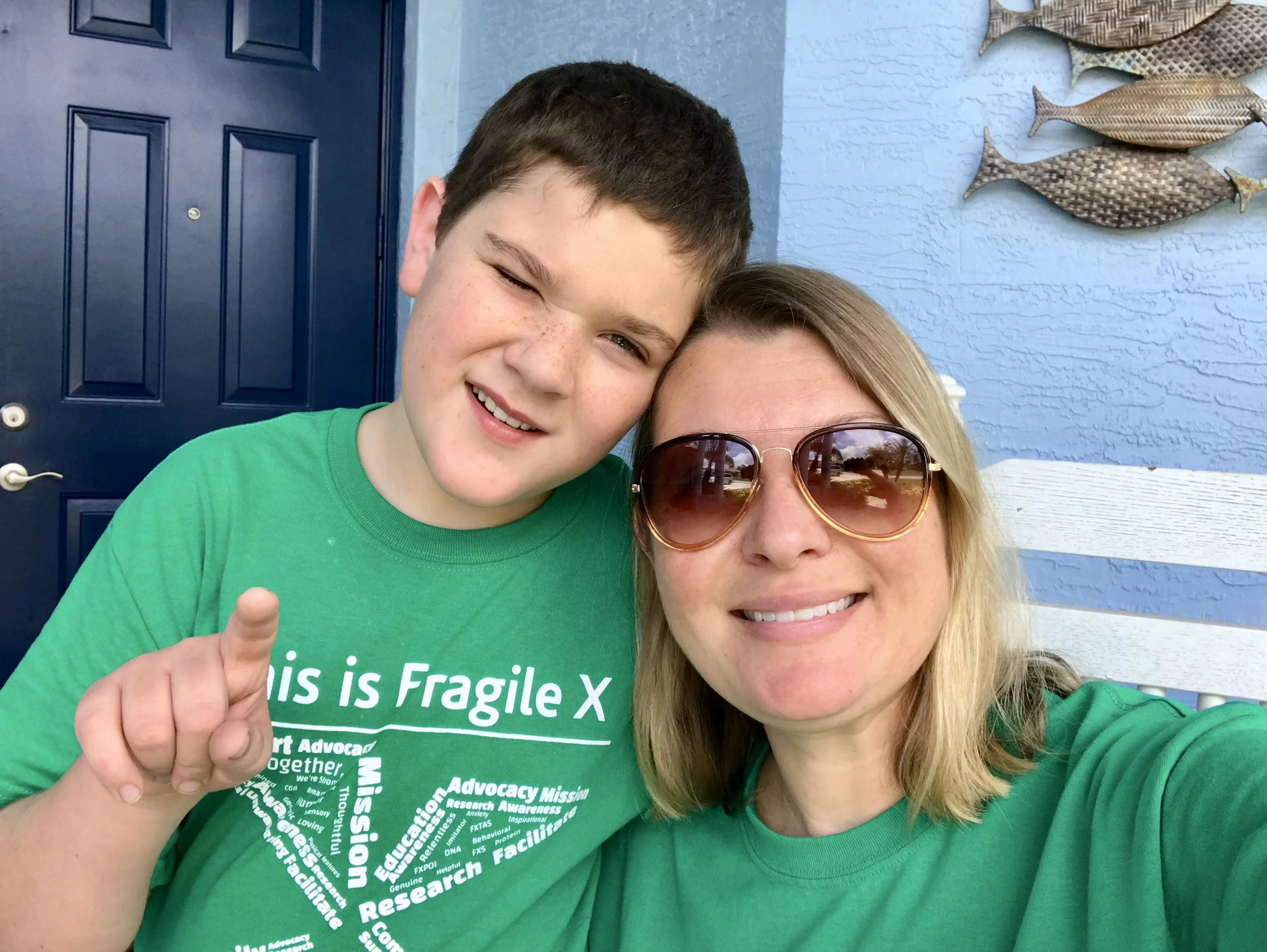Today, July 22, is Fragile X Awareness Day.
Fragile X is a spectrum disorder similar to autism but has a known genetic cause.
(This is not a perfect definition, but it’s the quickest way for me to explain in a way that people outside the Fragile X community will understand.)
This post is going to be about both my experiences with Fragile X as well as how Fragile X is portrayed in my forthcoming YA novel, DEVIL SPRINGS. (And if you want to skip to the punchline: it’s a spectrum disorder so my own son’s Fragile X and the book character’s Fragile X are vastly different.)
I learned about Fragile X and that I was likely a carrier of Fragile X while dating Kevin but before we were married—early 2001 sometime. My sister-in-law, a nurse, made the connection because I had a half-sister with a son with Fragile X. I was not in touch with this sister or her son, but our mutual sister-in-law was. Confused? Well, ya know, that’s family.
Through my own internet research I concluded that our shared father was the carrier, I was likely a carrier, and if my half-sister was far enough along with her pre-mutation that she had a fully affected child, my pre-mutation was likely that far along as well.
I didn’t follow-up with genetic testing until after I married Kevin, but when I did, it confirmed all of the above. I had a heart for adoption and did not want to invest in any sort of preimplantation testing, so that’s the route we went when starting our family. But, seven years into our marriage, after adopting twice, we found out (surprise!) I was pregnant. We chose not to test until after our child was born. In fact, we didn’t even find out the gender because I knew that if we found out it was a boy (who are generally more severely affected) I’d be more stressed over the pregnancy. Abortion, for us was not a consideration, so the rest of it didn’t matter since knowing our Fragile X diagnosis a few months before our child was born verses a few months after, wasn’t going to make a difference in terms of treatment.
On May 23, 2009 our son was born at home (planned!) and became a truly joyous addition to our family. About two months later we receive his Fragile X diagnosis. Our son is hilarious and witty. He is verbal with a high vocabulary, but he also rushes his words and is hard for many to understand. He’s been potty trained since he was three, but at ten still doesn’t wipe his butt at home (not sure about at school). He’s never had a seizure—a possible symptom of Fragile X we were most worried about, but he does struggle with transitions and will often scratch and hit—a symptom we didn’t know anything about and one we’ve since even sought behavioral interventions to “fix.” He’s never taken any medications until, possibly now. (We are in a clinical trial, but he may be on the placebo.) He doesn’t read independently, but he listens to stories well. He doesn’t ride a bike, but he can swim.
I could go on and on.
I have a forthcoming novel with a character with Fragile X. This character, Drew, is not much like my son. He has a mosaic variation (some genes are methylated and some are not — meaning some function typically and some do not.) In Drew’s form of mosaicism he is very high functioning. He can even read on grade level (9th grade). His Fragile X related struggles are more with fine motor skills and anxiety. There are other learning disabilities and delays that are not explored in the book. (And therefor not “canon,” so those details can continue to live in my head and nowhere else!)
I don’t know if my son understands he has Fragile X. He has never given us an indication that he knows or is bothered by the fact that he’s different. I am used to be speaking for him, making decisions for him, etc. If there are not radical medical breakthroughs in the next ten years, I will likely be his legal guardian well after he turns eighteen.
On the other hand, Drew understand his diagnosis well. Drew can advocate for himself. Drew’s future (beyond the time of the book) independence is very much up in the air. In writing Drew, I had to address my own ableism as well as my main character’s savior complex and how that did and didn’t work in the story.
I want readers to understand that Drew is a rare (really, really rare) example of Fragile X, so this book is not the best in terms of Fragile X Awareness. But I also didn’t write this novel explicitly to spread Fragile X awareness.
There’s an often forwarded post about special needs kids not being weird or odd—they only want to be accepted. I understand the kind intentions behind this forward/share/repost, but I always roll my eyes when I see it.
Many special needs ARE weird and odd and they STILL want to be accepted in spite of or because of those weird/odd characteristics. The point is, let’s make room for differences. Not overlook. Not gloss over with a happy forward. Let’s admit when disability makes us uncomfortable, face that discomfort and do something about it. And if doesn’t make us uncomfortable, go on and laugh through the weird and odd. Not at the expense of, but in appreciation of. See the difference?
Acceptance is integral to the theme of my book though Drew but also in other story lines. Even so, neither Drew nor the book are meant to be the end all, be all understanding of Fragile X.
And, since it’s a spectrum disorder, neither is my son.
To get a bigger picture, FragileX.org is a great resource, but searching #thisisfragilex on Instagram might prove more fun.
